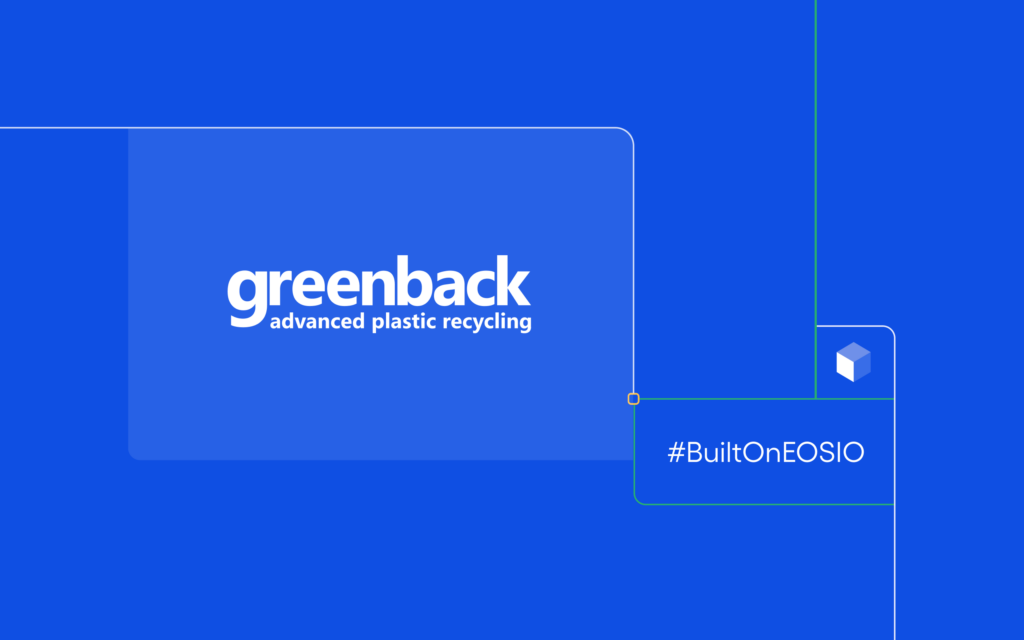
译文/Translated:
气候变化已经成为我们日常生活的中心话题,我们正在寻找更好的方法减少塑料垃圾。塑料回收和认证公司Greenback和ARXUM合作,利用EOSIO在塑料回收供应链上带来更大的透明度。
世界各地的政府机关都利用各种方法减少塑料垃圾,如要求消费性包装公司(CPG)公司支付执照费。各地政府想通过政策增加生产者责任,从而减少(过度)包装的有害影响。CPG公司一般会把这个责任外包给合规的公司,让它们帮自己跨价值链进行管理。
欧洲公司Greenback的创始人和CEO Philippe Von Stauffenberg认为,这些政策很难真正生效,这背后有几个原因。他说,其中一点是因为缺少透明度,从而导致服务提供方欺诈。“CPG认为它们的包装已经被收集、分类和回收了,但是其中一些外包公司只是把这些包装运到国外,这样,这些公司就可以节约成本、保留一大块执照费用。”
Philippe说,想通过技术途径实现有效的垃圾回收也存在一些技术障碍。“发达国家的多层垃圾和被有机物质高度污染的塑料垃圾一般都被焚烧了。而在其他地方,往往这些垃圾就被送到垃圾填埋场,但是最上层的塑料可能就被风吹走、掉到海里。”这就影响了全世界的海样生态。据计算,每天从森林、高山、沙漠生态开始,一路下来,大约有800万件塑料制品最终会飘到海里。
利用科技实现可持续发展
Greenback想把塑料和铝制品重新回收,进入工业圈,把以前被认为是垃圾的废弃包装重新变成有价值、可回收的商品,通过这个方式,它希望能减少二氧化碳排放、减轻化石燃料枯竭问题。
在Greenback的目标区域中,罐头和PET瓶这类好回收的材料会被收集、过秤、批量处理。Greenback开发了一个化学回收技术,通过热裂解(即酶促解聚)工艺,把剩下的、没有价值的箔片和多层塑料转换成石油。这就给价值链上的收集方提供了额外的收入流,同时,也给CPG新的包装提供了回收后的材料。
利用区块链技术建设更好的世界
Greenback可持续、分布式回收管理的方法利用EOSIO减少欺诈,它提供了一个可验证的方式溯源塑料包装和处理过的材料。
过去一些回收站只利用AI技术和传感系统称量塑料的重量,判断收集方带来的塑料的准确数量、并马上支付费用。Greenback计划给这些回收站提供设备,让它们能够通过每个收集方的EOSIO区块链账号,按实际情况分配资金。
收集方会根据他们送来的塑料垃圾的质量获得酬劳。带着有机或其它垃圾的湿塑料价值比已经分类过的干塑料低。系统通过智能合约、按照塑料的质量进行支付,这样,就不存在收集方是否收到应得的报酬这样的问题了。
Greenback还利用EOSIO,保证合作的回收站收集到的所有塑料存有安全的加密记录。送来的每一份塑料都会用区块链系统留下电子记录,每当回收站收到一千克塑料,智能合约都会生成一个相应的代币。这些代币可以被用来追踪和验证这些处理过的垃圾资产是否已经变成新的、干净的原材料。
企业可以预先购买代币,保证可以拥有通过该收益购买塑料垃圾生产出的石油。等原材料处理完、生成新的回收塑料之后,企业可以利用区块链记录确定它们确实利用了回收材料。这样,企业就更能符合法规要求,也让相关部门在验证的时候能够马上审核包装材料的供应链。
Greenback创始人
Philippe von Stauffenberg是一名连续投资人和企业家。他在投资领域已经有20年的经验了。2010年,他购买了德国最大的回收系统,后来就投资于各项技术,创造更高的回收率。2018年Philippe建立Greenback Recycling Technologies,其目标是利用图像识别、AI、区块链和化学回收等新技术解决方案修正回收行业的问题。
你有建立在EOSIO之上吗?
我们的 #建立在EOSIO 系列展示了利用EOSIO科技的一些卓越的项目,它们都能为我们更加安全和联系的世界添砖加瓦。如果您想给我们下一个阶段的项目提建议,请给我们的开发者关系小组发送邮件spotlight@block.one
获得更多关于Block.one通过战略投资和风投合作伙伴基金的方式支持EOSIO生态,请访问b1.com
–Block.one开发者关系小组
重要通知:所有提供的材料都受此重要通知的约束,您必须自行熟悉此间条款。该通知包含与我们软件、出版物、商标、第三方资源以及前瞻性声明相关的信息、限制和约束内容。通过访问我们的材料,您接受并同意此通知的条款。
原文/Original:
With climate change taking the center stage of daily life, we find ourselves searching for better methods to reduce plastic waste. Greenback, a plastic recycling and certification company, works with ARXUM to use EOSIO to provide greater visibility in the plastic recycling supply chain.
Around the world, government agencies are introducing measures to reduce plastic waste, such as requiring license fees for Consumer Packaged Goods companies (“CPGs”) to offset the impact of packaging through extended producer responsibility schemes. The CPGs usually outsource this responsibility to compliance companies to assist with managing across their value chains.
In Europe, Greenback Founder and CEO Philippe Von Stauffenberg explains, multiple factors prevent these regulations from being truly effective. He says one of those factors is service provider fraud due to a lack of transparency. “CPGs think that their packaging is being collected, sorted and recycled, whereas some of their service providers are just exporting it overseas, thereby saving costs and keeping a higher proportion of license fees for themselves.”
According to Philippe there are also technological barriers that prevent effective recycling of plastics through mechanical processes. “Multilayered plastic and plastic waste heavily contaminated with organic material is usually incinerated in developed countries. In the rest of the world it can find its way into landfills where loose plastic on the surface is picked up by the wind and carried into the ocean.” The impact is felt in marine ecosystems around the world. It is calculated that every day approximately 8 million pieces of plasticend up in the ocean, collecting in forest, mountain, and desert ecosystems along the way.
A Technology Driven Approach to Sustainability
Greenback’s goal is to help reduce CO2 and fossil oil depletion by recirculating waste plastics and aluminum into the industrial cycle, and elevating discarded packaging formerly considered waste to a valuable, harvestable commodity.
In the regions where Greenback seeks to make an impact, easily recyclable materials such as cans and PET bottles are collected and processed en masse at weighing centers. Greenback has developed a chemical recycling technology that turns the rest of the films and multilayer plastics with no value into an oil via a process known as pyrolysis or depolymerization. This provides collectors in the value chain with an additional income stream, and provides CPGs with recycled feedstock for new packaging.
Building a Better World on Blockchain Technology
Greenback’s approach to sustainable distributed recycling management utilizes EOSIO to mitigate fraud and offer a verifiable means to trace the origins of plastic packaging and processed materials.
Greenback’s plan is to outfit recycling centers that once simply weighed plastic with AI technology and sensor systems to determine the exact quality of plastic pickers bring, and provide instant payment, to be meritocratically distributed through each picker’s associated EOSIO blockchain account.
Collectors get paid according to the quality of plastic waste they deliver. Wet plastics with organics and other materials fetch less than dryer, pre-sorted batches. Since the system manages payments through Smart Contracts based on the quality of the plastics, there is never any question as to whether or not a picker receives equitable compensation for their work.
EOSIO gives Greenback a means to keep a secure cryptographic record of all plastic collected at participating centers. Each batch of plastic delivered is digitally tracked by the blockchain system and whenever a kilogram of materials is collected, a smart contract creates a corresponding digital token. The tokens can be used to track and authenticate the processed plastic assets that are turned into new, clean, raw materials.
Companies can pre-purchase tokens to secure the ownership of oil resulting from plastic purchased with the proceeds. Once the raw materials are processed back into recycled plastics, companies may use the blockchain records to confirm they are using recycled materials. This makes it easier to adhere to regulations, and offers compliance officials a means to readily audit the supply chain of packing materials for verification purposes.
Meet the Founder
Philippe von Stauffenberg is a serial investor and entrepreneur. His experience in the investment world spans across well over two decades. In 2010 he bought Germany’s largest recycling system, and has since invested in various technologies to create higher recycling rates. Philippe founded Greenback Recycling Technologies in 2018 with a mission to mend a broken recycling industry with the use of new technology solutions such as image recognition, AI, blockchain and chemical recycling.
Are You Building on EOSIO?
Our #BuiltOnEOSIO series showcases some of the amazing projects leveraging EOSIO technology to build a more secure and connected world. If you would like to suggest a project for us to feature please send an email to spotlight@block.one for our Developer Relations team to review.
For more information on how Block.one supports the EOSIO ecosystem through strategic investments and venture capital partnership funds, visit b1.com.
– Block.one Developer Relations team
Important: All material is provided subject to this important notice and you must familiarize yourself with its terms. The notice contains important information, limitations and restrictions, relating to our software, publications, trademarks, third-party resources and forward-looking statements. By accessing any of our material, you accept and agree to the terms of the notice.
原文链接/Original URL: